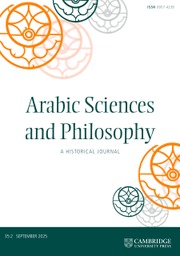UNFOLDING PARALLEL REASONING IN ISLAMIC JURISPRUDENCE
Epistemic and Dialectical Meaning in Abū Isḥāq al-Shīrāzī’s System of Co-Relational Inferences of the Occasioning Factor
Published online by Cambridge University Press: 09 May 2018
Abstract
One of the epistemological results emerging from this initial study is that the different forms of co-relational inference, known in the Islamic jurisprudence as qiyās, represent an innovative and sophisticated form of reasoning that not only provides new epistemological insights into legal reasoning in general but also furnishes a fine-grained pattern for parallel reasoning which can be deployed in a wide range of problem-solving contexts and does not seem to reduce to the standard forms of analogical argumentation studied in contemporary philosophy of science. However, in the present paper we will only discuss the case of so-called co-relational inferences of the occasioning factor and only in the context of Islamic jurisprudence.
Résumé
Cette première étude permet notamment de dégager ce résultat épistémologique: les différentes formes d’“inférence co-relationnelle” connues dans la jurisprudence islamique sous le nom de qiyās représentent une forme innovante et sophistiquée de raisonnement qui permet non seulement d'avoir une conception épistémologique plus claire du raisonnement légal en général, mais aussi de produire une mécanique bien huilée pour le “raisonnement parallèle”; cette mécanique du “raisonnement parallèle” peut être déployée selon un large spectre dans différents cadres de résolution de problèmes et ne semble pas se réduire aux formes standard de l'argumentation analogique étudiées en philosophie des sciences contemporaine. Nous n'aborderons cependant dans la présente étude que le cas de la dénommée “inférence co-relationnelle du facteur occasionnel”, et ce seulement dans le contexte de la jurisprudence islamique.
- Type
- Research Article
- Information
- Copyright
- Copyright © Cambridge University Press 2018
Footnotes
To the memory of my late Great-Uncle Alama Khalil Bin Mohammad Arab and to his son Yahya Ansari (S. Rahman)
- 13
- Cited by




